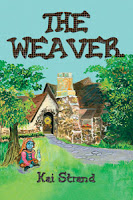Children’s Literacy Promotes Strong Problem Solving Skills
To celebrate Children’s Book Week, I am focusing on the
benefits of children’s literacy in order to encourage parents, grandparents,
caregivers, siblings to model strong reading habits to the younger children in
their lives.
In my experience, children who have grown up reading, being
read to and listening to audio books not only have a well-developed vocabulary,
but they are also better communicators.
As a writer I often hear, “Know your audience.” What this
means is that if I am going to write a short story for the 5 – 8 year old crowd
I have to use age appropriate vocabulary and I have to keep the storyline
linear. Younger children can't follow multiple storylines
within a single story. Don’t get me wrong, I’m not dumbing down to
the 5 – 8 year olds. The story itself can be complex and emotional.
I use this as an example because if that 5 – 8 year old
continues to develop their reading skills over the years, they will eventually
be reading books with a diverse cast of characters, which address social issues
or personal struggles, failure, success. Some characters will be well spoken
and articulate. Some will speak an urban language they learned on the streets.
Some might say or do things that shock the reader and others may fail to do
what the reader expects, in turn disappointing them.
Hmmm, sounds like life. And that’s my point.
A child who reads, is read to, or listens to audio books is
exposed to the world in a safer, more controlled environment. One day,
that reader is going to be out in the real world experiencing real world
situations that will mirror things they’ve read about. Based on their reaction
to the fictional or non-fictional retelling, they will be able to act or react
with the benefit of having had some experience in the situation. And when I say
“one day” I actually mean everyday.
In my book, The Weaver,
which is included in the tote bag of books being given away at the end of this
week, the main character Mary feels different from her friends and family. Then
something happens to make her feel like even more of an outcast. Yet, instead
of burying her head in the sand and blending into the background, she works and
works and works until she finds a way to no longer feel like an outcast.
It is my hope that the children (and adults!) who read The
Weaver will benefit not only from the lyrical language, but from the
overall message of persistence. A child who read The Weaver in 5th
grade might need to dwell upon the lesson again in 6th or 7th
grade, but will be more equipped to do so having witnessed how Mary handled her
own situation.
****
To increase your chances in the giveaway; become a GFC follower
of this blog by clicking the "Join this site" button in the right sidebar, like my facebook page, KaiStrand,
Author and leave a comment on this post. Remember to sign up through
Rafflecopter:
a Rafflecopter giveaway
Then visit the other GAP authors participating in the blog
hop:
Guardian Angel Publishing Author Blogs:
Come back here tomorrow. Author, Mike Hays, is
participating in my weekly Three Times a Charm feature with bonus children’s
literacy content.



Thanks for some very interesting thoughts today Kai!
ReplyDeleteChild literacy is a great topic. Even here in the US there are children who can not read - or barely read. Terrific post, mate.
ReplyDeleteBOOKS for Kids - Manuscript Critiques
http://www.margotfinke.com
Remember that old Coca-Cola commercial? I sing it a little differently, "I'd like to teach the world to read."
DeleteIf they read The Weaver and Nancy Stewart's new book Kristin and Winter, they will definitely get the idea. I didn't know GAP was doing this cause I've been off the web. but great minds and all that...My blog post this week at Pen and Ink is on the same subject, plus Teacher Appreciation Week and Mothers Day. What book made you a reader? http://thepenandinkblog.blogspot.com/
ReplyDeleteOh I just finished a new YA called "Don't Expect Magic by Kathy McCullough. I loved it and I think you might, too. Blessings
Sue B.
I'll definitely stop by your blog, Susan, and thanks for the book rec. I'll add it to my tbr list. I love getting suggestions from other readers.
DeleteYes, literacy is king today. So necessary and lagging in some instances. Wonderful post.
ReplyDeleteAll continued success with the week, Kai, and beyond...
And thank you, Susan.
I think it is sad how easily literacy can be obtained and yet it is still neglected in many households. Sad, sad, sad.
DeleteHave a great blogging week, too, Nancy!
Great post, Kai! I also think that age-appropriate language is the first thing we should keep in mind when writing children's stories, especially picture books. Otherwise we can lose our readers, no matter how well-written the book is or how exciting the plot.
ReplyDeleteI am one to stretch the age appropriate language rule, but I'm not writing picture books and I try to frame an advanced word so that the reader can understand the context. I don't do it often, but I do it consistently (if that makes sense).
DeleteOne HUGE benefit to e-readers is the instant dictionary look up. I use the feature all the time on my Kindle.